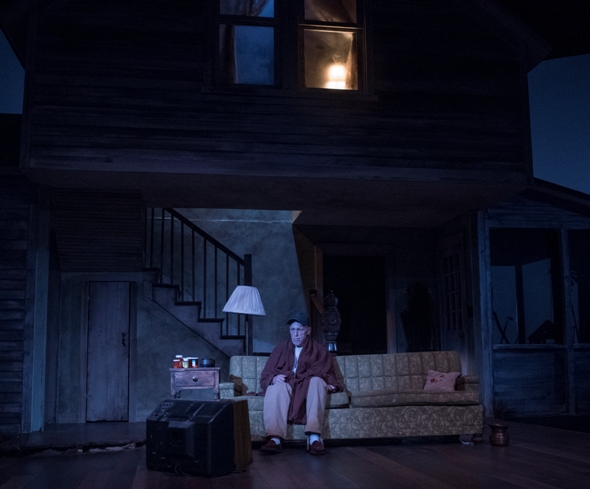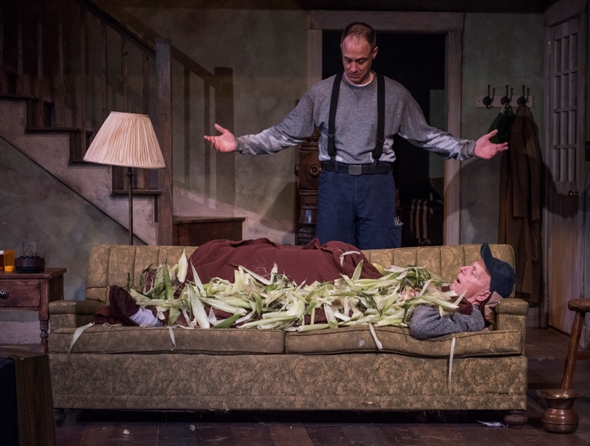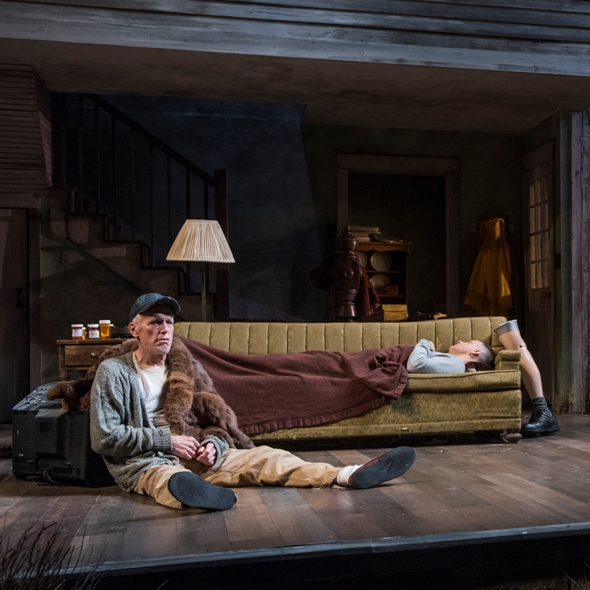‘Buried Child’ at Writers: Shepard’s Greek tragedy, cast in a fractured American family
“Buried Child,” by Sam Shepard, directed by Kimberly Senior, at Writers Theatre through June 17. ★★★★
By Nancy Malitz
An essay in the Writers Theatre program book ties Sam Shepard’s Pulitzer Prize-winning 1978 play “Buried Child” to the decaying Midwest rural class. Maybe. That segment of society sure was beaten up in the decades after WWII.
But “Buried Child” is a modern tale that feels like ancient Greek to me. No disputing that Shepard, a young man of 35 when he wrote it, had already assimilated the muscles and sinew and inebriate fog of the great American plays by his predecessors Eugene O’Neill, Tennessee Williams, Arthur Miller and Edward Albee. They are all there in Shepard’s tales emanating from the broken-down part of the 20th century country he favored.
 Shepard’s darkly funny brilliance is not so much about the decline of an American way of life as it is about us humans losing sight of ourselves in a blur of treachery, self-denial and retribution that threatens to extend through the generations backward and forward. As directed by Kimberly Senior in a superb production, Sam Shepard’s realm is a bleak pasture of the heart, where truths too painful to confess refuse to stay buried no matter how much mind-numbing alcohol or sexual abandon or vagabondage are applied.
Shepard’s darkly funny brilliance is not so much about the decline of an American way of life as it is about us humans losing sight of ourselves in a blur of treachery, self-denial and retribution that threatens to extend through the generations backward and forward. As directed by Kimberly Senior in a superb production, Sam Shepard’s realm is a bleak pasture of the heart, where truths too painful to confess refuse to stay buried no matter how much mind-numbing alcohol or sexual abandon or vagabondage are applied.
“Buried Child” ends with a staggering catharsis that cracks the earth like an early spring, but the play opens with a hilarious tease that calls to mind Brick’s wife in Tennessee’s “Cat on a Hot Tin Roof,” when she rattles on and on, and on, and her husband Brick finally responds, “Did you say something, Maggie?”
Dodge – played to a testy, sardonic turn by Larry Yando – is a sickly, older version of Brick, a burned-out husband who has inoculated himself with alcohol and made an art of not listening to anything his wife is saying. Oh, Dodge is listening, all right – fixated on the exact location of Halie (Shannon Cochran) upstairs in their unpainted ramshackle house, the better to calculate the likelihood that she will descend. (The paint and dignity are gone from designer Jack Magaw’s handsome bones of a homestead, but you can sense its better days.)
 What Halie says, Dodge mostly ignores. What he’s bent on is his next swig from the slim bottle secreted in a slit of the sofa that soon will be his grave. Dodge may be near death, but in one quest he is still nasty and fiercely persevering: He’ll demote you from hero to zero, or promote you vice versa, depending solely on your willingness to help wet his whistle.
What Halie says, Dodge mostly ignores. What he’s bent on is his next swig from the slim bottle secreted in a slit of the sofa that soon will be his grave. Dodge may be near death, but in one quest he is still nasty and fiercely persevering: He’ll demote you from hero to zero, or promote you vice versa, depending solely on your willingness to help wet his whistle.
Cochran and Yando are a match made in – well, some ideal place. Her Halie is a feisty, non-stop talker with an outside sex life. His Dodge is fine with that. The caustic melody of their upstairs-downstairs repartee reveals its rhythm and consuming purpose soon enough; the questions and non-answers – the sarcastic jousts and jabs – fill the time and space in and around their waking hours as if to squeeze out something dreaded.
It’s a quintessentially stalwart American family of a certain kind, perhaps, in that some things are forbidden to speak of. Memories are twisted, not quite erased, mulishly kept at bay. Old things. The mere threat of digging that stuff up is tantamount to picking a fight.
The couple’s oldest son, Tilden (Mark L.Montgomery), has recently returned after a long stay in New Mexico because, as he put it, he didn’t know where else go to, couldn’t figure anything out, didn’t know what to do. He’s a hulk, vaguely scary, nearing 50, given to simple-minded expressions. Tilden brings a vague unspoken history of trouble, too, and a stubborn streak. Lately, he has been disappearing into the long dormant fields around the house and returning with strangely fantastic armloads of corn, carrots, whatever he finds, to general alarm and mounting dismay. And then Tilden starts talking about a baby. A little tiny baby.
 Shepard gives us plenty to chew on in the portrait of these mystifying champions of epic family struggle. In Yando, Cochran and Montgomery, Writers Theatre has supplied three virtuosos adept in the art of chafe, rot, rankle and gall.
Shepard gives us plenty to chew on in the portrait of these mystifying champions of epic family struggle. In Yando, Cochran and Montgomery, Writers Theatre has supplied three virtuosos adept in the art of chafe, rot, rankle and gall.
Before the secrets can unravel, however, four more people in this closely knit cast need to add their voices to the din:
The youngest son, Bradley (Timothy Edward Kane, crackling with spent-up anger), once whacked off one of his legs with a chainsaw, which makes him the metaphorical likeness of his impaired dad. Father Dewis (deliciously feckless Allen Gilmore) is a randy preacher who spends hours indulging Halie’s physical desires, as well as her insistence that a third son, who died ingloriously in a motel room, would have been the family’s savior despite all evidence to the contrary.
Representing the next generation in this hilarious nightmare is Vince, Tilden’s bewildered, heavy-drinking son – and thus the grandson of Dodge, although both fail to recognize him when he shows up with his girlfriend in tow. Shelly giggles, telling Vince that the place looks like a Norman Rockwell painting in need of the milkman, a dog and Dick and Jane. Shane Kenyon and Arti Ishak play the young couple who arrive without clue of what they’re walking into. Norman Rockwell is nowhere to be found.
 By the time this remarkable story turns toward its end, the putrifying, still nasty Dodge has been balded, blanketed and corn-husked by his sons. But the Furies aren’t done with this family yet – something this production makes clear, as one son armed with a devastating body of evidence climbs the stairs toward confrontation.
By the time this remarkable story turns toward its end, the putrifying, still nasty Dodge has been balded, blanketed and corn-husked by his sons. But the Furies aren’t done with this family yet – something this production makes clear, as one son armed with a devastating body of evidence climbs the stairs toward confrontation.
Shepard is interested in the cost too great to bear as a family’s damage festers. With spare language and unrelenting grip on the destiny that has pursued Dodge and Halie and their kin, he has made a story of singular beauty and breath-taking finish. In Writers’ underscoring, the delayed judgment comes as a burst of relief, rimmed at last, perhaps, with hope.
Related Link:
- Performance location, dates and times: Details at TheatreInChicago.com
Tags: Allen Gilmore, Arti Ishak, Buried Child, Jack Magaw, Kimberly Senior, Larry Yando, Mark L. Montgomery, Sam Shepard, Shane Kenyon, Shannon Cochran, Timotny Edward Kane, Writers' Theatre



1 Pingbacks »